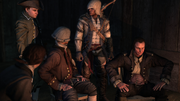No edit summary |
Francesco75 (talk | contribs) (Adding categories) Tag: categoryselect |
||
| Line 40: | Line 40: | ||
[[Category:Sons of Liberty]] |
[[Category:Sons of Liberty]] |
||
[[Category:Founding Fathers]] |
[[Category:Founding Fathers]] |
||
| + | [[Category:Continental Congress]] |
||
Revision as of 07:54, 19 April 2015
- John: "We must now all hang together."
- Benjamin: "Yes, we must indeed all hang together, or most assuredly we shall all hang separately."
- —John and Benjamin Franklin signing the Declaration of Independence, 1776.[src]
John Hancock (1737 – 1793) was one of the Founding Fathers of the United States, serving as a merchant, patriot, and a statesman. His name became slang for a signature as he was the first person to sign the Declaration of Independence, and his name was the largest on the document.
Born in Massachusetts, Hancock was the son of the Reverend John Hancock, Jr., who died when he was young, so Hancock was sent to live with his grandfather, the Reverend John Hancock, Sr., in Lexington. When his grandfather died, John went to live with his prosperous uncle Thomas at Beacon Hill; when Thomas Hancock died, John inherited his shipping business.
John first became involved in the fight against the British when they confiscated his sloop, the HMS Liberty, in 1768, on charges of smuggling. In 1769, the HMS Liberty was burned by Patriots, and this demonstration was one of the first acts of open defiance towards the British Royalists.
In 1774, Hancock was elected to replace James Bowdoin in the Second Continental Congress. However, before Hancock reached Philadelphia, he was re-elected by the Provincial Congress in February of 1775. As such, Hancock gained major influence in Massachusetts, and posed a threat to the British.
At the start of the war, Hancock and Samuel Adams were staying at the Hancock-Clarke House in Lexington, then owned by the Reverend John Clarke. Major John Pitcairn prepared an assault on the town, intending to arrest them and avoid a violent revolution.
However, Paul Revere and the Assassin Connor arrived the night before, warning the two Sons of Liberty to leave, as the latter believed Pitcairn intended to kill them. Hancock was particularly reluctant to leave, wanting to fight alongside John Parker's militia. Hancock subsequently became President of the Continental Congress, where he met Connor again during the signing of the Declaration of Independence in 1776.


